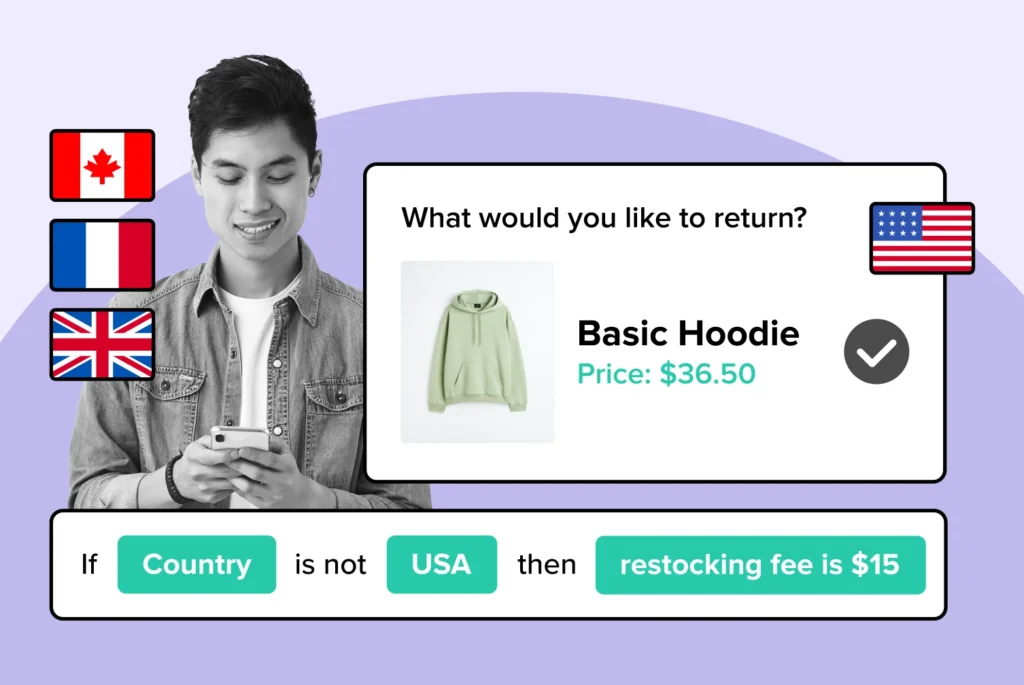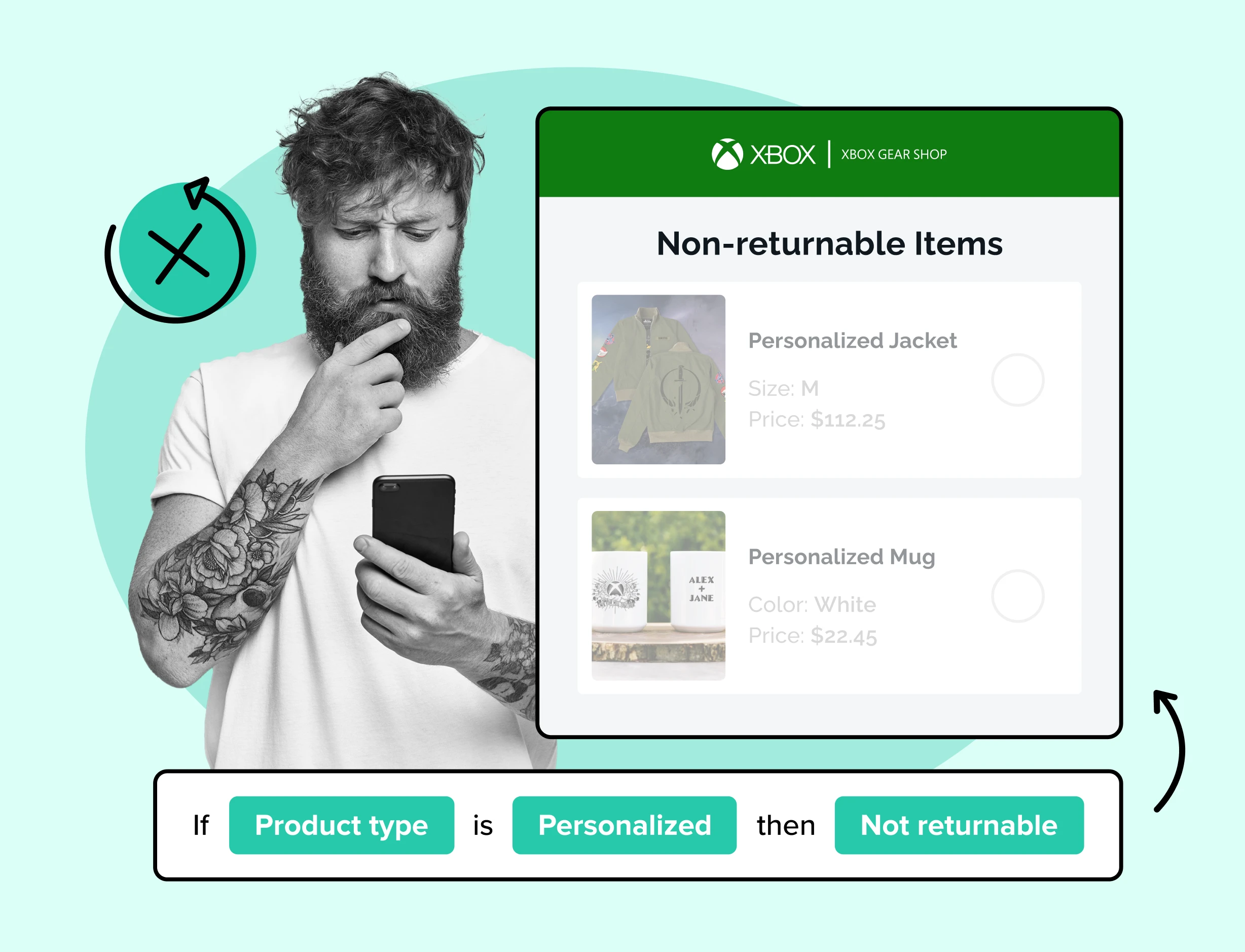
Mastering Cross Border Ecommerce: Essential Strategies for Global Expansion
Strategies that can reduce your return-related carbon footprint, save costs, and resonate with environmentally-conscious consumers.
Shipping, Tracking & Notifications
Boost customer experience and reduce support tickets
Realtime order and shipment tracking
Proactive order and shipping notifications
AI-Enhanced Discounted Labels
Predictive pre-purchase estimated delivery dates
Self-Serivce branded order tracking
Effortless experience delivered
Identify and Resolve Order Issues
Realtime order and shipment tracking
Make returns profitable and delight customers
Flexibility to define any return destinations & conditions
Simplify returns for your customers and team
Incentivize exchanges over returns
Returns management made easy for your team
Returns management made easy for your team
Easy claims and smart upsells
Understand why your customers are returning
In-Store & Curbside Pickup
Unify the online and the in-store experience
Hassle-free pickup experience for customers
In-Store dashboard to keep operations streamlined
In-Store and Online orders unified
Drive foot-traffic to your stores
Shipping, Tracking & Notifications
Boost customer experience and reduce support tickets
Realtime order and shipment tracking
Proactive order and shipping notifications
AI-Enhanced Discounted Labels
Predictive pre-purchase estimated delivery dates
Self-Serivce branded order tracking
Effortless experience delivered
Identify and Resolve Order Issues
Realtime order and shipment tracking
Make returns profitable and delight customers
Flexibility to define any return destinations & conditions
Simplify returns for your customers and team
Incentivize exchanges over returns
Returns management made easy for your team
Returns management made easy for your team
Understand why your customers are returning
In-Store & Curbside Pickup
Unify the online and the in-store experience
Hassle-free pickup experience for customers
In-Store Dashboard to keep operations streamlined
In-Store and Online orders unified
Drive foot-traffic to your stores
Boost customer experience and reduce support tickets
Realtime order and shipment tracking
Proactive order and shipping notifications
AI-Enhanced Discounted Labels
Predictive pre-purchase estimated delivery dates
Self-Serivce branded order tracking
Effortless experience delivered
Make returns profitable and delight customers
Flexibility to define any return destinations & conditions
Simplify returns for your customers and team
Incentivize exchanges over returns
Returns management made easy for your team
Equip your team for precise return checks.
Easy claims and smart upsells
Understand why your customers are returning
Unify the online and the in-store experience
Hassle-free pickup experience for customers
In-Store Dashboard to keep operations streamlined
In-Store and Online orders unified
Drive foot-traffic to your stores
Find the answer to all your questions
Take a step by step trip through our functionality to see how we can improve your ecommerce processes.
Explore the most comon questions about WeSupply
Calculate the ROI that WeSupply can bring you
Read actionable articles on how to optimize your post-purchase experience and decrease support tickets
Get inspired by stories of how our customers implemented an effortless post-purchase experience
Wondering if WeSupply is a good fit for you? Read through our use cases to see how we can help you increase conversion & improve CX!
A Deep Dive into Top Companies' Order Tracking & Returns Strategy
Find the answer to all your questions
Explore the most comon questions about WeSupply
Calculate the ROI that WeSupply can bring you
Request a no strings attached review of your current shopping experience and missed conversion opportunities
Take a step by step trip through our functionality to see how we can improve your ecommerce processes.
Read actionable articles on how to optimize your post-purchase experience and decrease support tickets
Get inspired by stories of how our customers implemented an effortless post-purchase experience
A Deep Dive into Top Companies' Order Tracking & Returns Strategy
Wondering if WeSupply is a good fit for you? Read through our use cases to see how we can help you increase conversion & improve CX!

Tackling returns for custom-made items? Streamline the process and safeguard your profits with proven strategies outlined in our article. We’ll guide you through how to manage returns for custom made products, from establishing transparent policies to applying effective quality control measures, all tailored to minimize losses and maintain happy customers.
The management of returns for custom-made products presents unique challenges such as high correction costs, limited resale value, and balancing customer satisfaction with business viability.
Efficient handling of custom product returns involves clear return policies, a transparent communication strategy, and leveraging technology to streamline processes for both quality assurance and logistics.
Businesses should employ strategic approaches like offering store credit, fostering customer relationships through personalized service, and using customer feedback and return data to drive product improvements and policy refinements.
WeSupply streamlines returns for custom-made products with tailored policies, a branded portal, and self-service options. The platform supports flexible rules, QR code labels, and efficient tracking. It enhances customer interaction with proactive notifications and leverages return data for insights and improvement. This integrated approach fosters effective communication and personalized solutions, optimizing the return process and customer satisfaction. Ready for smoother returns? Start with WeSupply now!
Custom-made products often symbolize the epitome of customer satisfaction. They fulfill unique customer needs, providing a personalized touch that off-the-shelf products often lack. However, the personalized nature of these products presents unique challenges in managing returns, which can significantly impact a business’s bottom line. Notably, the high costs associated with correcting errors in custom product specifications, the limited resale value due to their personalized nature, and the intricate balance of customer satisfaction and business viability, all come into play.
While some retailers may be tempted to make the return process difficult, studies show that an easy return process increases the likelihood of customers making a repeat purchase. This process, also known as reverse logistics, involves decisions on whether to recycle, repair, resell, or destroy returned items, and how to compensate customers. Therefore, managing returns effectively can result in better customer insights, aiding in product improvements and reducing future return rates. Furthermore, efficient handling of custom product returns can lead to cost savings by minimizing waste and optimizing the resale or repurposing of returned items.
However, the returns process for custom products is complicated and time-consuming, as each item must be inspected individually to assess its condition and potential for resale. Production costs for custom-made products are higher because of the unique attention to detail required for each item, raising challenges for offering free returns in eCommerce. Understanding these unique challenges is crucial in crafting strategies to effectively manage returns while enhancing customer satisfaction.
The high costs associated with managing returns of custom-made products are a significant challenge for businesses. Here are some reasons why:
Errors in custom product specifications can result in high costs for corrections as additional time, labor, and materials are required.
Custom-made products have limited resale value as they are specifically designed for an individual customer and may not suit others.
It becomes difficult for businesses to recover costs from returned items.
Moreover, high production costs of custom-made products make it challenging to sustain free returns, a common expectation in the eCommerce industry. To mitigate these challenges, businesses can improve their forward logistics processes, such as providing more accurate product descriptions and better packaging to avoid damage. It is also crucial to establish processes for assessing the condition of returned custom products to determine if they can be resold, repurposed, or need to be discarded.
WeSupply offers a compelling solution for retailers facing the dual challenges of high return costs and limited resale opportunities. By integrating its seamless return management system, companies can significantly reduce expenses associated with product returns while enhancing the likelihood of reselling returned items at full value. This approach not only streamlines operations but also guarantees a return on investment (ROI), making it a strategic asset in today’s complex retail landscape. Curious about how it can transform your business? Try our ROI Calculator and see the difference for yourself.
Balancing customer satisfaction with business viability is another unique challenge when managing returns for custom products. A clear and specialized return policy for custom products can help in balancing customer satisfaction with business viability by:
reducing the likelihood of disputes and misunderstandings
providing clear guidelines for customers on how to return custom products
setting expectations for the return process
Automating the returns process for custom-made products with systems like WeSupply can improve customer experience while making the process more efficient for the business.
Streamlining the e commerce returns management process through technology can aid in enhancing the overall customer experience and retaining positive customer relationships. Here are some key strategies to consider:
Have a clear and transparent return policy that is easily accessible to customers. This helps manage customer expectations and reduces frustrations.
Ensure quick processing of eCommerce returns. Delays can discourage customers from making future purchases or recommending the retailer.
Provide visibility into the returns process through tracking and alerts. This maintains customer trust and satisfaction during the return process.
WeSupply addresses the complexities of managing custom product returns while ensuring customer satisfaction and maintaining business efficiency. By offering tailored solutions that cater to the nuances of ecommerce logistics, WeSupply empowers businesses to navigate the challenges of returns seamlessly. The service simplifies returns, enhances customer loyalty, and streamlines operational processes, striking a balance between satisfying customers and safeguarding business viability.
Key features:
Self-Service Return: Empower customers with a frictionless returns experience, allowing them to manage returns at their convenience.
Automated Returns Management: Save time and reduce manual errors by automating the returns process, cutting down the time spent on returns by up to 80%.
Branded Return Portal: Create a consistent brand experience across all touchpoints, avoiding generic solutions for a more integrated customer journey.
Returns Tracking: Provide customers with the ability to track their returns easily, enhancing transparency and trust.
Post-Purchase Notifications: Engage customers post-purchase with high open-rate notifications and personalized deals to encourage repeat business.
Implementing these strategies can help improve the returns experience for your customers and strengthen your relationship with them.
Customization and personalization are critical aspects of enhancing customer experience in the e-commerce sector. Customization allows customers to personalize products they purchase, such as choosing colors or adding custom messages. On the other hand, personalization is the process of tailoring the shopping experience to individual customer needs and preferences, often using data on past purchases or browsing behavior. Both customization and personalization can increase customer satisfaction and loyalty through tailored product recommendations and content.
Despite their similarities, it’s important to differentiate between personalization and customization.
Personalization focuses on the buying habits of the customer
Customization deals more with product features and options.
Personalization aims to provide convenience and encourage repeat purchases
Customization emphasizes uniqueness and customer engagement.
Thus, setting clear customer expectations by defining and differentiating between customization and personalization can help in reducing return rates.
Communicating customization constraints and return policies is critical for setting realistic expectations and ensuring customers understand the limitations of product personalization. Here are some key points to consider:
Clearly communicate return policies, especially for customized products, to ensure customers are aware of the conditions under which returns are accepted.
Educate customers on the specific features that can be customized and the extent to which products can be personalized to avoid unrealistic expectations.
Provide detailed information about customization options and any limitations upfront to manage customer expectations and reduce the likelihood of returns.
Moreover, the terms and conditions should include the following information:
Return and refund clause: Clearly explain the process for handling returns and refunds, especially for customized products.
Shipping and delivery information: Include any limitations on the customization of products and set clear expectations for customers.
Guidelines for user-generated contributions: Set rules regarding content submission, such as customized product reviews or feedback.
Therefore, clear communication of customization constraints and return policies is of the utmost importance in managing returns for custom products.
WeSupply assists businesses in defining customization and personalization by setting clear customer expectations through tailored return policies. This approach not only streamlines return processes but also enhances inventory management by aligning policies with the unique characteristics of customized and digital products. By clarifying these policies, WeSupply helps businesses reduce losses and manage customer expectations effectively, ensuring a transparent and satisfactory shopping experience.
Key features:
Specialized Return Policies: Create specific return policies for different product lines or categories to align with their unique characteristics and manage returns more efficiently.
Return Policy for Digital Products: Establish clear policies for non-returnable downloadable or digital products, communicating the value and permanence of these items to customers.
Discover how to revolutionize your returns process – Book your WeSupply demo today!
Speed up returns process
Book a quick call with our experts to see how WeSupply’s self-service returns makes it super easy for your customers to return anything, anytime – without needing to submit customer support tickets or call in!
Paravel, a company committed to producing high-quality, sustainable luggage and accessories, faced a significant challenge: managing the complexity of delivering personalized and bundled items sourced from multiple locations. Their traditional systems, involving multiple platforms and 3PL systems, were inefficient, making it impossible to track orders effectively.
To address these issues, Paravel partnered with WeSupply, integrating all data points into one comprehensive system. This collaboration enabled Paravel to split bundled products into individual items, update customers on personalization status, and centralize order information. As a result, Paravel improved customer satisfaction by providing transparent, real-time updates on every step of the delivery process, reducing customer service inquiries and enhancing the overall shopping experience.
For a detailed exploration of how Paravel revolutionized their delivery process, enhancing customer satisfaction while maintaining their eco-conscious brand ethos, Read the full case study.
Quality assurance plays a significant role in reducing product returns. By ensuring that products are produced and controlled consistently against set quality standards, businesses can minimize returns due to quality issues. High-quality product images and accurate visual representations play a critical role in reducing product returns in eCommerce by ensuring that customers receive what they expect.
Therefore, investing in quality assurance processes is a strategic move towards enhancing customer satisfaction and reducing return rates.
Implementing high standards in the production process is a proactive approach to reducing return rates for custom products. Here are some steps to follow:
Establish and follow a set of manufacturing quality standards to ensure uniformity across the manufacturing process of custom products.
Consider implementing quality standards such as ISO 9000 and 9001 to maintain compliance with industry standards and regulatory requirements.
Regularly monitor and evaluate the production process to identify any areas that may be contributing to inconsistent quality.
Train and educate employees on the importance of maintaining high quality standards and provide them with the necessary tools and resources to do so. By following these steps, you can reduce return rates and improve customer satisfaction with your custom products.
Detailed product descriptions, including thorough specifications and usage details, help to set accurate customer expectations and reduce return rates for custom products.
In addition to implementing high standards, leveraging best practices in quality control is key to minimizing returns and enhancing customer satisfaction. Good Manufacturing Practices (GMP) are systems of processes and documentation to ensure that products are produced and controlled consistently against quality standards, which is vital for custom products.
The IATF 16949 standard guides manufacturers in the automotive industry to continuously improve processes, thereby reducing defects and waste in custom automotive parts, which can lead to lower return rates. Therefore, effective quality control measures can greatly contribute to fewer returns and a more satisfied customer base.
WeSupply’s Automated Returns system revolutionizes quality assurance in the returns process. By enabling businesses to define specific quality check criteria, the system ensures a standardized inspection for every returned item. Collecting images and feedback directly from customers enhances transparency and understanding of return reasons. Moreover, the feature allowing warehouse staff to leave notes on each return quality inspection fosters better inventory management and decision-making. This comprehensive approach not only streamlines the returns process but also significantly impacts the overall quality and customer satisfaction.
Key features:
Define Quality check criteria for consistent product evaluations.
Collect product images and feedback for a clear understanding of returns.
Enable warehouse notes for detailed quality inspections on each return.
Crafting an effective return policy for custom products is a critical aspect of managing returns. A good return policy should include:
Clear instructions
Clarification of return conditions
Easy-to-read language
Avoidance of jargon that could confuse customers
Clear explanation of which types of custom products can be returned
This will help make customers feel at ease and understand the return process for their custom products.
Also, including the brand voice in the return policy can engage customers and showcase the company’s values and goals.
Transparency and clear communication are essential in crafting a return policy for custom products. Transparency in the return policy, especially regarding non-returnable custom products or products on sale, helps manage customer expectations and prevent post-purchase dissatisfaction. A transparent return policy can turn the challenge of returns into an opportunity for the business by encouraging repeat purchases and customer loyalty.
Communicating with customers through customer support services when they are returning products can create positive engagement and address any pain points they may have.
One of the key aspects of crafting an effective return policy is tailoring it to customer needs and product specifics. Tailoring the return policy to the specifics of custom products includes:
Defining the acceptable product condition for return
Clearly stating any limitations or restrictions on returns
Providing clear instructions for initiating a return
Outlining the process for receiving a refund or exchange
This is crucial for both you and the company, minimizing misunderstandings and ensuring a smooth return process.
Providing multiple return options tailored to customer needs can increase the likelihood of customer satisfaction and repeat business. Therefore, tailoring return policies to cater to both customer needs and the specifics of custom products is a crucial aspect of managing returns effectively.
WeSupply empowers businesses to tailor return policies to the specific needs of their customers and the particulars of their products. By offering the flexibility to create custom return policies, businesses can easily manage various aspects of ecommerce logistics, from final sale items to return window lengths. Furthermore, with the Policy Enforcer feature, WeSupply automates the approval, rejection, or flagging of returns and exchanges based on predefined conditions, simplifying complex return policies and ensuring a seamless process tailored to both business and customer needs.
Store credit is a powerful tool in the management of returns for custom products. Offering store credit can incentivize customers to make higher purchases, potentially increasing a retailer’s sales. Additionally, retailers offering store credit may attract new customers and benefit from word-of-mouth marketing. However, retailers need to balance the amount of store credit extended to maintain healthy cash flow.
Offering flexible refund options, such as store credit, can significantly enhance customer retention. The option of store credit as a refund can increase customer retention by providing a flexible alternative to traditional refunds. By offering store credit in place of refunds, businesses can prevent revenue loss and keep the money within the ecosystem, which can lead to repeat purchases.
Therefore, offering store credit as a refund option can be a win-win for both customers and businesses.
Understanding the impact of store credit on consumer behavior and business economics is crucial in optimizing return policies. Accepting store credit can impact the amount of cash on hand and influence the amount of product a store keeps in stock. Effective management of store credit is crucial to avoid losses from unpaid credit, which can affect stock costs and business profitability.
Therefore, the impact of store credit on consumer behavior and business economics should not be overlooked in managing returns for custom products.
WeSupply plays a crucial role in enhancing customer retention and boosting sales by promoting the use of store credit as an alternative to traditional refunds. This strategy not only incentivizes exchanges over returns, thereby preserving sales, but also increases the average order value by encouraging customers to opt for items of equal or greater value. By converting returns into exchanges and offering refunds in the form of store credit, gift cards, or coupons, businesses can maintain a positive relationship with their customers and encourage future purchases.
Key features:
Convert returns into exchanges with flexible options.
Incentivize exchanges over returns to save sales and increase order value.
Offer refunds as store credit, gift cards, or coupon codes to encourage repeat business and build trust.
Discover the transformative impact of flexible returns on your customer satisfaction and retention. Ready to elevate your returns process? Book your WeSupply demo today and unlock the full potential of store credit and exchange strategies!
Streamlining the return process is a key aspect of enhancing the customer experience, especially for custom products. Efficient logistics and automation can greatly enhance the customer experience during the return process. For instance, creating a centralized returns handling center can minimize disruptions from returns on the distribution process and allow for efficient sorting of returned items.
Also, integrating forward and reverse logistics can reduce complexity and save time by combining pickup and delivery routes.
Simplifying logistics and embracing automation can significantly streamline the returns management process. Automation solutions, such as automated sorting systems, can streamline the returns process by quickly determining the next steps for a returned item, reducing the need for manual handling.
Implementing automation software like Warehouse Management Systems (WMS), inventory management system, and Order Fulfillment Software can provide insights into returns, track asset recovery, and manage product repair or refurbishment. Therefore, simplifying logistics and embracing automation can make the return process more efficient and customer-friendly.
Implementing efficient, customer-centric return solutions can significantly enhance the customer experience. An automated returns process can create customer loyalty by leaving a positive impression through a hassle-free return experience. Offering a more streamlined returns process with automation, retailers can gain a competitive advantage and exceed customer expectations for convenience and efficiency. Some benefits of implementing an automated returns process include:
Increased customer satisfaction
Improved customer loyalty
Reduced customer effort
Faster processing times
Enhanced operational efficiency
By investing in an automated returns process, retailers can improve their overall customer experience and gain a competitive edge in the market.
Therefore, focusing on efficient, customer-centric return solutions is key to enhancing the return experience and fostering customer loyalty.
WeSupply streamlines the return process to enhance the customer experience significantly. By offering a branded returns portal, the platform ensures a seamless, cohesive brand experience that fosters customer loyalty. The self-service returns process empowers shoppers, aligning with their expectations for a frictionless return journey. Additionally, WeSupply’s flexibility in returns rules caters to diverse customer needs, enhancing overall satisfaction.
Key features:
Self-Service Returns: Allow customers complete control over the return process.
Flexible Return Rules: Tailor your return policies to fit various use cases.
Autogenerated QR Code Return Labels: Simplify returns with easy QR code scanning, eliminating the need for printing.
Returns Tracking: Enable customers to track their returns easily for peace of mind.
Post-Purchase Notifications: Engage customers with timely email and SMS updates to encourage repeat business.
Leveraging customer feedback is a powerful strategy for driving improvement and innovation in returns management. Here are some key benefits of collecting and analyzing customer feedback during the returns process:
Gain valuable insights into customer preferences and pain points
Adjust product offerings and marketing strategies to better meet customer needs
Identify areas for improvement in the returns process
Enhance customer satisfaction and loyalty
Drive innovation and new product development
By actively listening to your customers and incorporating their feedback into your returns management strategy, you can create a more customer-centric and successful business.
Encouraging feedback and responding to it in a timely and complete manner is a part of customizing the return experience to meet customer needs. Therefore, leveraging customer feedback can lead to continuous improvement and innovation in managing returns for custom products.
Utilizing return data can lead to significant enhancements in product quality and customer service. By analyzing returns data, businesses can:
Identify common complaints or issues with products
Make data-driven decisions to enhance product design
Improve material quality
Update product descriptions
These actions can help improve overall customer satisfaction and reduce the number of returns.
Collecting user feedback after a product launch is crucial for making informed decisions to enhance the product, leading to increased market share and customer loyalty. Therefore, utilizing return data can be a valuable tool in enhancing product quality and service.
WeSupply leverages return data to enhance product quality and customer service by providing insights into why customers return items. This allows businesses to identify the most returned products and understand the reasons behind these returns. Additionally, it helps in identifying patterns among serial returners. By using these actionable insights, companies can reduce their return rate and improve overall service and product quality.
Encouraging constructive criticism and adapting to customer needs is a strategic approach to improving custom product offerings. By analyzing returns data, businesses can identify common complaints or issues with products, allowing for data-driven decisions to enhance product design, material quality, or update product descriptions.
Making it easy for customers to leave feedback can be achieved by:
Offering various channels for feedback (e.g. email, phone, online forms)
Using user-friendly platforms for feedback submission
Providing clear instructions on how to leave feedback
Encouraging constructive criticism can lead to continuous improvement and innovation in managing returns for custom products.
WeSupply champions the importance of constructive criticism and adaptation to customer needs through comprehensive logistics analytics. Emphasizing a data-driven decision-making process, WeSupply believes that understanding and measuring customer experiences is pivotal to business improvement. By providing tools to track CSAT and NPS, the platform enables businesses to gauge their performance and identify areas for enhancement. This focus on analytics ensures that companies can fine-tune their services, leading to an effortless and delightful customer experience that evolves alongside customer expectations.
Effective communication and personalized solutions are critical aspects of returns handling. Timely and transparent customer interactions are essential for customer retention, especially in markets where customers have numerous alternatives. Transparency in communication helps in building trust, leading to customer satisfaction and loyalty.
Therefore, focusing on effective communication and personalized solutions can significantly enhance the return experience and foster positive customer relationships.
Timely and transparent customer interactions play a significant role in managing returns for custom products. Transparency in the company’s values and approach to relationships, when communicated to customers, frames the personalized return experience and fosters positive relations. Continuous communication with customers, through social media and regular press releases, reinforces transparency and keeps the business in the customer’s awareness.
Therefore, the significance of managing returns in a timely manner and maintaining transparent customer interactions for custom products cannot be overstated.
Customizing the return experience can significantly foster positive customer relationships and enhance satisfaction. By striving to maintain customer satisfaction, customizing the return experience through honest communication and respecting customer feedback can enhance brand loyalty and customer relationships.
Encouraging feedback and responding to it in a timely and complete manner is a part of customizing the return experience to meet customer needs. Therefore, customizing the return experience is a key aspect of fostering positive customer relationships and enhancing customer satisfaction.
WeSupply enhances the returns handling process through effective communication and personalized solutions, ensuring a positive and transparent customer experience. By integrating high-engagement post-purchase email and SMS notifications, WeSupply keeps customers informed and engaged, reducing the need for follow-up calls and fostering loyalty with personalized offers. Moreover, with intuitive returns tracking, customers enjoy real-time visibility into the status of their returned items, eliminating confusion and common questions related to return times and processes.
Key features:
Combat inconvenience with proactivity & self service
Book a quick call with our experts to see how WeSupply can help you make returns easy for your customers with a beautiful, self-service solution that makes their experience easier while also providing new ways to lower costs and earn back revenue.
In conclusion, managing returns for custom products poses unique challenges that require strategic approaches to navigate. Businesses need to be proactive in their strategies by:
Understanding the intricacies of high costs and limited resale value
Implementing high standards of quality control
Emphasizing transparency and clear communication
Leveraging customer feedback
Offering flexible refund options like store credit
By following these steps, businesses can effectively manage returns for custom products.
Automation and streamlined logistics can enhance the return experience, and focusing on customer loyalty through exceptional service and empathy can foster lasting customer relationships. Therefore, businesses need to continuously innovate and adapt their strategies to effectively manage returns of customized products.
To sum up, managing returns for custom products is a complex process that requires a fine balance between customer satisfaction and business viability. Clear communication, transparency in terms and conditions, high-quality assurance, and customer-centric return policies play a crucial role in handling returns effectively. Offering store credit as a flexible refund option can enhance customer retention, while leveraging customer feedback can drive improvement and innovation. Streamlining the return process through automation and efficient logistics can enhance customer experience, and training staff for empathy can boost customer loyalty. By synthesizing these strategies, businesses can effectively manage returns of customized products, enhance customer satisfaction, and maintain business sustainability.
WeSupply offers an effective solution for managing returns of custom-made products by enabling businesses to tailor return policies specifically for these items. The platform streamlines the return process through a branded returns portal, self-service options, and flexible rules. It enhances customer experience with autogenerated QR code labels, efficient returns tracking, and proactive post-purchase notifications. WeSupply also utilizes return data for insights, encouraging constructive criticism and adapting to customer needs, while ensuring effective communication and personalized solutions in returns handling. This comprehensive approach helps businesses reduce return rates and increase customer satisfaction. Transform your custom product returns management today. Get started with WeSupply!
The process of managing returned goods includes tasks such as receiving and processing returns, inspecting and restocking items, managing customer expectations, handling financial transactions, and ensuring legal compliance. It is a comprehensive process that requires attention to detail and clear communication with customers.
Allowing returns on customized products can lead to expanded sales and lower return rates, benefiting both the business and the customers. Therefore, having a lenient return policy can be a win-win situation for all parties involved.
WeSupply allows businesses to create custom return policies specifically designed for custom-made products, addressing unique challenges such as non-returnability and specific return conditions.
Yes, WeSupply provides efficient returns tracking and autogenerated QR code return labels, enabling customers to easily follow their return’s progress in just a few clicks.
WeSupply offers a branded returns portal and self-service return options, making the process transparent and user-friendly, which in turn increases customer satisfaction.
Yes. WeSupply has an Official Shopify App. You can download it and start integrating with your Shopify Store.
Yes, WeSupply has an official extension for Magento. The WeSupply x Magento integration allows for automating order tracking experiences, reducing customer inquiries, automating shipping email and SMS notifications, and providing a fully branded order tracking experience
Yes, WeSupply has an official BigCommerce App. You can integrate WeSupply with your BigCommerce store to improve your post-purchase customer experience.

Learn How To Create Successful Post Purchase Email Campaigns
Build an effective post-purchase email flow that helps you increase customer satisfaction and drive revenue growth!

Strategies that can reduce your return-related carbon footprint, save costs, and resonate with environmentally-conscious consumers.

Vital sustainability metrics to track in eCommerce: from assessing carbon output to reducing packaging waste!

Let’s explore how the anchor – often the initial price – can impact return rates, satisfaction, and ultimately, a business’s bottom line!

Actionable strategies for a streamlined returns process that prioritizes customer satisfaction and operational efficiency!

Strategies that can reduce your return-related carbon footprint, save costs, and resonate with environmentally-conscious consumers.

Discover how to allocate resources strategically, cut unnecessary costs, and position your business for scalable growth!

Let’s explore this focused rundown of the Shopify apps that a merchant needs, handpicked to power your store’s growth without excess!

How returns affect your marketing numbers: actionable strategies that harness the data from returns to balance & boost your marketing plans!

Get ready to learn essential techniques for accurate, scalable, and user-friendly product data management that drives sales!